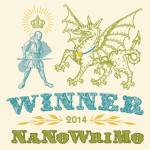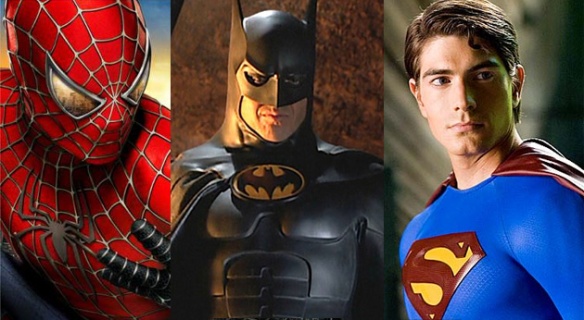NaNoWriMo is an event that spans the month of November with two goals: Increase your word count, and help you finish a first draft. Many writers (especially new ones) struggle with both of those things.
Personally, I’ve never had trouble with either in the past. The first draft of my debut novel was done in about a year (and I was working on at least 4 other stories at the time). I also could boast 4,000+ words on the days that I wrote, because I was passionate about my writing and had lots of free time.
Then I published a book. The last six months leading up to that release date were the hardest I’d ever worked on a single writing project. I couldn’t sleep, I forced myself to forego other forms of entertainment in favor of editing and rewriting, and I couldn’t write any of my other ideas for fear of losing interest in that story.
Needless to say, when I finally let go of that book and left it to the hands of the masses, I stopped writing. For a month and a half all I did was read, watch TV, and play games. It was a much needed brake… and it ruined my writing flow. When I sat down to begin the newest draft of The Coming Storm (the sequel to my debut) I could barely sit still long enough to write a paragraph.
Slowly, as I let my mind wander to my other stories, I upped that to a scene per sitting. Then to two to three sittings per day. But I wasn’t even hitting 1,000 words per day (outside of the occasional blog post). It was a depressing time for me. I felt like I’d ruined my only shot at a career I was good at. (I’m no master yet, but I recognize my talent for what it is)
Along came NaNoWriMo. It was the middle of October and I could see this event looming on the horizon. I had wanted to participate since the year before when I’d discovered it; I’d even written an outline for a story that I swore I wouldn’t write outside of the event. And here I was, barely writing anything. So I forced myself to write; 500 words per sitting minimum, or I couldn’t read or watch anything… and no more games (except my weekly Tabletop). This also meant no food either, since I’m incapable of eating without something to entertain me during a meal.
I had begun to write nearly 2,000 words every day I wrote, but I wasn’t writing every day yet. November hit and I tried my hardest. I still couldn’t make myself write daily, but I was consistently writing around 1,500 – 3,000 words on the days I did. I even took note that the further behind I got from the par goal on the website the more I wrote on that day.
Lesson the first:
Deadlines Matter (or Set Goals)
Even arbitrary ones like NaNoWriMo help improve word count. Telling myself “You have to write 8,000 words today to have any hope of succeeding” made me write more than I had on any previous day that month.
Lesson the second:
Arbitrary Deadlines Can Only Get You So Far
Yep, I just said they are helpful. Now I’m going to explain why they aren’t. In NaNoWriMo the result of failing is a resounding “Oh well, I’ll try again next year”. There is no punishment, no consequences for failing to meet your deadline. Why? Because it’s meant to encourage new writers, and 50,000 words in a thirty day period is hard for some veterans.
When I was given six months to finish my novel or give up as an author, it kicked me into high gear. I worked harder than I ever had to ensure that I had a product I was proud of, and a career I loved. (And that same deadline is hanging over my head now for book 2) When I was given thirty days to write a first draft of a book that might not be published for years, I felt no urgency. I nagged myself to do it, but I knew failure was totally an option. There was no downside.
Lesson the third:
I’m a Seat-of-my-pants Writer
I’ve always written as the ideas come to me, and outlines were difficult for me. I knew that it was considered out of the ordinary to do so though, so I tried outlining when I could. The first book I ever published had an outline, so I made myself do one for NaNoWriMo as well, assuming it would help me meet the goal. I was wrong. The outline for my first book was a great starting point, and a neat thing to show my friend, but the final story was so different from that outline that I’m not even sure it was worth doing in the first place. And my NaNoWriMo project? I had a hard time writing it every day because the outline was so detailed that I felt like the story was already written.
When I hit that 4,000+ mark in a day of writing, it’s because I’m writing as the ideas come. I’m switching stories in the middle of a scene. I don’t have a schedule or force myself to stick to a single story. Sometimes I’m not even writing prose, and am, instead, writing pages of backstory that no one will ever read. That’s what works for me. It may not work for you.
Above all else, NaNoWriMo has taught me where to start a new writer. If you hope to someday make a career out of writing: Start with setting a realistic goal. (I will write and finish a first draft in 2015. I will outline a story during the month of February.) Move from there, to adding deadlines with consequences. (If I don’t finish my first draft in the next six months, I have to sell my Xbox. If I don’t write 2,000 words today then I can’t watch a movie with my friends.) Follow through. (I actually did sell my Xbox in pursuit of my career.) If you can’t bring yourself to do it, have a friend be in charge of the punishment; they will usually do it. Use an arbitrary deadline (like NaNoWriMo) to discover what kind of writer you are. If you normally outline, force yourself to write a first draft without doing it. If you never outline, force yourself to before you even start writing. Let the absence of fearing failure allow you to experiment, while still having a deadline hanging over your head.
I didn’t meet my goal of 50,000 words this November, but I did manage to triple my word count from the four months leading up to it combined. I’d say, in the regard of improving my word count (and reminding me why I write in the first place), it was a success. And for that I deserve this badge, even if the website disagrees.




